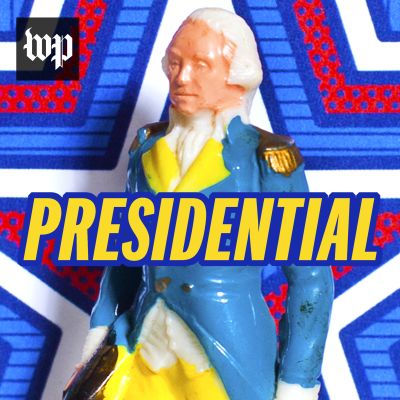The Washington Post's Presidential podcast explores how each former American president reached office, made decisions, handled crises and redefined the role of commander-in-chief. It was released leading up to up to Election Day 2016, starting with George Washington in week one and ending on week 44 with the president-elect. New special episodes in the countdown to the 2020 presidential election highlight other stories from U.S. presidential history that can help illuminate our current moment. Hosted by Lillian Cunningham, the series features Pulitzer Prize-winning biographers like David McCullough and Washington Post journalists like Bob Woodward. [When you're done, listen to Lillian's other historical podcasts: Constitutional and Moonrise]
Gesamtlänge aller Episoden: 1 day 13 hours 59 minutes
Abraham Lincoln: His hand and his pen
Doris Kearns Goodwin, author of 'Team of Rivals,' and Michelle Krowl of the Library of Congress guide us through Lincoln's love for language--and how his gift for writing and oratory became one of his greatest presidential leadership tools.
James Buchanan: The bachelor and the bloodshed
America is on the eve of civil war, and James Buchanan is alone in the White House as our first and only bachelor president. Historians Jean Baker and Jim Loewen, and The Washington Post's Jim Tankersley, explore the lack of personal and political union.
Franklin Pierce: Rolling off the tracks
Pulitzer Prize-winning biographer James McPherson and historian Edna Greene Medford discuss Franklin Pierce's role in the country's progression toward civil war, as well as the personal tragedy that unfolded right before he took office.
Millard Fillmore: Teaching the obscure presidents
Should we teach the presidency of Millard Fillmore? What do we lose if we don't? Historians Jean Baker and James McPherson, along with Washington Post education reporter T. Rees Shapiro, tackle these questions in our 13th episode.
Zachary Taylor: War heroes and conspiracy theory
Washington Post columnist Dana Milbank joins historians Catherine Clinton and Joseph Uscinski to talk about military hero Zachary Taylor and the assassination theories that swirled around his death in the White House.
James K. Polk: Getting it done
They Might Be Giants singer John Linnell and historian Amy Greenberg are guests on this episode. Through hard work and strategic lying, the 11th president managed to accomplish everything on his agenda. But is being effective the same as being great?
John Tyler: Ghosts and the vice presidency
When Vice President Tyler took over the White House, he set a precedent that would forever shape the office. This episode features experts Barbara Bair and Joel Goldstein, as well as descendants who talk about the ghost who haunts the Tyler home.
William Henry Harrison: Great song, horrible death
Washington Post humor columnist Alexandra Petri, along with Barbara Bair and Dr. Philip Mackowiak, deconstruct Harrison's transformative presidential campaign and debunk the myth of what killed him after only 32 days in office.
Martin Van Buren: The story of our two-party system
Martin Van Buren did much to create the political party establishments we have today. Experts Barbara Bair and Mark Cheathem, along with Washington Post reporter Chris Cillizza, examine his mark on modern politics.
Andrew Jackson: The violence, the fight
Barbara Bair, Steve Inskeep and Jon Meacham examine the tragedy of Andrew Jackson's personal life, the brutality of his battles and his policies against Native Americans, and the conflict that makes up a dynamic democracy.
